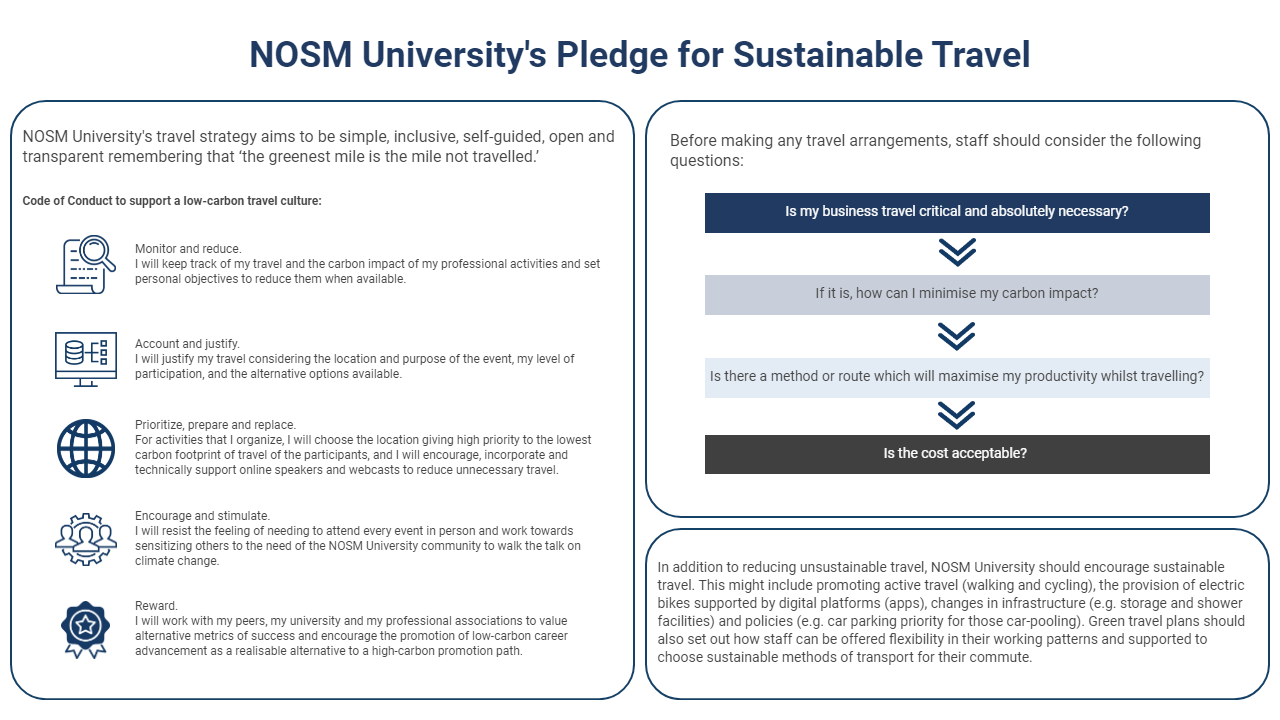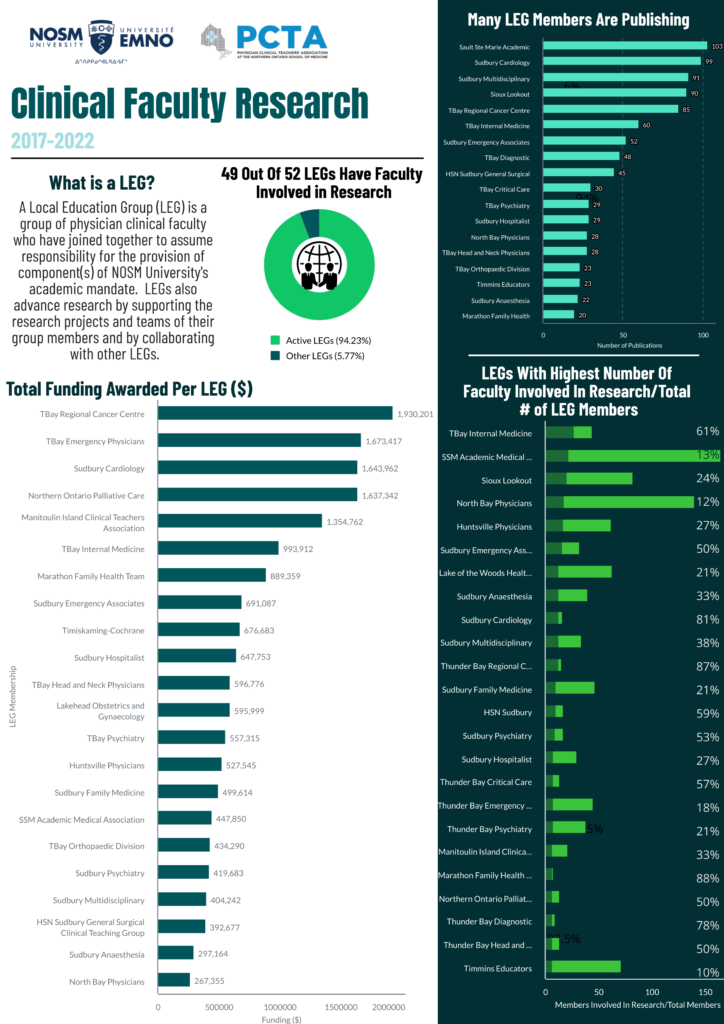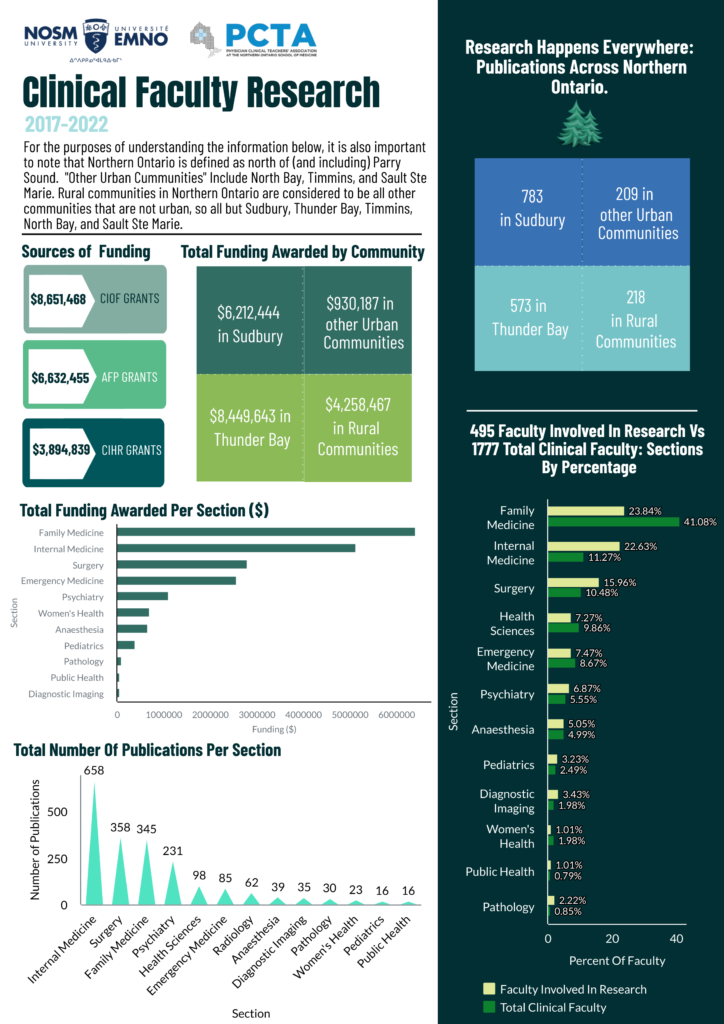Planetary health is human health. NOSM University is taking action on climate change.
Posted on April 12, 2023
Earth Day is April 22, 2023—and yes, there is a climate crisis.
Hello, Bonjour, Aanin, Boozhoo, Tanshi, Kwe Kwe,
Ahead of Earth Day, I am thinking about the planet and all of the life it supports. About nine years ago I was influenced by the following words:
“Planetary health is an attitude towards life and a philosophy for living. It emphasizes people, not diseases, and equity, not the creation of unjust societies. We seek to minimize differences in health according to wealth, education, gender, and place. We support knowledge as one source of social transformation, and the right to realize, progressively, the highest attainable levels of health and wellbeing.” Public to Planetary Health: A Manifesto. The Lancet. (Horton et al., 2014).
Thereafter, the call to environmental action for medical institutions came out in a leading journal in 2015, when The Lancet Commission on Planetary Health published Safeguarding human health in the Anthropocene epoch: report of The Rockefeller Foundation. But frankly, not much happened and the arguments put forth at the time are even more compelling today: to safeguard human health, we must repair and nurture the planet’s health. It seems so obvious that as a species, humans must act now. And yet, the disastrous effects of climate change are unfolding everywhere before our very eyes, including in Northern Ontario, where it has affected our water, food, and the biodiversity of our region. As health-care providers, we are naturally heavily invested in the health of the population, so it stands to reason that we too must lead in environmental changes necessary to sustain human health.
The Planetary Health Education Framework developed by The Planetary Health Alliance guides educators and leaders who wish to address the complex planetary health challenges of our world today. The framework asks participants to “create, restore, steward, and conserve healthy ecosystems for a thriving human civilization” under these five “domains:”
- Interconnection within nature;
- The Anthropocene (the human age) and health
- Equity and social justice
- Movement building and systems change
- Systems thinking and complexity
As a socially accountable institution that leads through a lens of health equity, NOSM University is planning for curricular changes, expanded research, and increased environmental advocacy to address planetary health. So, what are we actually doing?
In 2019, a letter from a group of concerned NOSM faculty led to the establishment of the Board Climate Change and Health Task Force. It developed a response to climate change and recommended implementation strategies (where feasible). Their report was presented in November 2020 and included these recommendations for 2020-2025:
- NOSM should declare a climate emergency and commit to reducing scope 1, 2, and 3 greenhouse gas emissions in keeping with the Intergovernmental Panel on Climate Change 1.5C report and our status as a ‘rich’ country;
- The key performance indicators and objectives and key results of the new strategic plan, The NOSM Challenge 2025, should be viewed through a planetary health and climate emergency lens immediately;
- NOSM must focus on renewing the education programs and curricula that positively influence the learner experience, foster wellness and resilience, and support the achievement of educational goals. We must incorporate learning of the crucial links between planetary health and human health into medical curricula;
- NOSM must focus on advancing service excellence and collaboration by updating systems, spaces, processes, and policies so they fully support and maximize efficiency and improve equity. Accountability and responsibility to our people, communities, stakeholders, and society as a whole is paramount;
- NOSM should utilize the many leadership positions held at national and international organizations to leverage positions for action on the climate crisis.
In 2021, responsibility for implementing these actions was put under the purview of the new Dean and the NOSM University Action Committee on Climate Change (previously the NOSM Advisory Council on Climate Change) was established. To date, the following activities have occurred:
- Our Strategic Plan identifies the commitment by NOSM University to “become a leader in internal practices that address climate change and environmental health” (Strategic Enabler 3, Investing in our Infrastructure);
- We declared 2021 to be our “Year of Climate Change and Social Justice”. In that year we also signed the Okanagan Charter, and we invested in research projects hosted by the Centre of Social Accountability that responded to climate change, social determinants of health, and building community and youth resilience;
- Major work on curricular renewal in both the MD program and in postgraduate programs is underway;
- We celebrate Earth Day, which was also the focus of the President’s Lecture Series in 2022 and which featured an amazing panel devoted to the topic. Please join us for the event planned on Friday, April 21, 2023. Details are below.
This year, we have established NOSM University’s pledge for sustainable travel and have joined the Global Consortium on Climate Change and Health Education. The Joint and Stipendiary Faculty Promotions Committee is suggesting mitigating climate change by allowing hybrid and virtual presentations to be counted towards promotions. In June 2023, NOSM University will be hosting the Summer Institute on Sustainable Health Systems with the CASCADES.
Please join me in thanking the NOSM University Action Committee on Climate Change, which is chaired by Dr. Elaine Blacklock, for their leadership, advocacy, and volunteer work to help NOSM University address climate change.
There is so much more to be done, but together, we can make NOSM University a medical education leader in efforts toward planetary health.
We are growing again
Now for an update since my last blog on the expansion of medical programs. The Government of Ontario has announced additional growth for medical programs with 100 new undergraduate medical school spots and 154 postgraduate positions as part of 2023 budget. NOSM University will add another 14 MD positions to the 30 already announced, for a total of 44 new MD spots for applicants to the medical program. Since our initial class in 2005 was 56 per year, we will soon be admitting 108 students per year—almost doubling the size of our class. Although the exact numbers of postgraduate program expansion are not yet decided, the likely doubling of our postgraduate positions may ensue with the opening of new specialty training programs.
This is remarkable news for Northern Ontario, and we are negotiating for additional resources to support our infrastructure and clinical teachers. In addition, there is a proposal to address the expansion of the Physician Assistants program under discussion. With the serious shortages of all health professionals in the country and in Northern Ontario, NOSM University is leading the province with innovative programs and a commitment to social accountability. I am speaking in many communities (City of Greater Sudbury Council) about their obligation to step up recruitment efforts and some of these initiatives are working!
Miigwetch, thank you, marsi, merci,
Dr. Sarita Verma
President, Vice Chancellor, Dean and CEO
NOSM University
If you have any feedback or comments, please reach out at president@nosm.caand follow me on Twitter @ddsv3.
A Note from the Action Committee on Climate Change
Planetary health is about much more than climate change. We humans are transgressing multiple planetary boundaries, most notably in regard to greenhouse gases, ocean acidification, chemical pollution, ecosystems and biodiversity, and the earth’s natural cycles of nitrogen and phosphorus. All of this has serious impacts on human health, both directly, and via the social determinants of health.
We, the Action Committee on Climate Change (ACCC), are embarking on the work of infusing NOSM University’s curriculum—and health care across Northern Ontario—with Planetary Health principles and knowledge, so that NOSM University graduates are fully prepared to care for patients, to teach, to advocate for a sustainable low-carbon university and health care systems, and to help create and lead the social mandate that will drive the enormous changes we urgently need here in Canada and globally.
If you are passionate about preserving a healthy, livable planet for everyone, including your patients and your children, please consider joining us on the ACCC.

Earth Day Celebration 2023
Join us for an Earth Day Celebration!
The Action Committee on Climate Change presents special guest speaker, Sam Hunter
Friday, April 21, 2023
12:00 – 1:00 p.m.
Via YouTube @nosmtv
Sam Hunter was born at Hawley Lake, located on the southern shore of Hudson Bay, and currently lives in the remote Cree community of Peawanuck, Ontario, in the middle of Polar Bear Provincial Park. While growing up, he lived in tents and sod teepees. Today, Sam is building an energy-efficient home which will harness energy from the sun, wind and water. This is an essential element for the green economy concept.
NOSM University faculty member receives Gairdner Momentum Award 2023
 Dr. Christopher Mushquash, NOSM University Professor, is the recipient of the very prestigious Gairdner Momentum Award 2023. Dr. Mushquash is Anishinawbe (Ojibway) and a member of Pawgwasheeng (Pays Plat First Nation). He is a Professor in the Department of Psychology at Lakehead University, Clinical Psychologist at Dilico Anishinabek Family Care, Vice President Research at the Thunder Bay Regional Health Sciences Centre, and Chief Scientist at the Thunder Bay Regional Health Research Institute. An alumnus of Dalhousie University, a recent Dal News article says that Dr. Mushquash “merges his clinical experience as a psychologist and his community-based participatory approach to research to meet community needs and improve systems and services that make a difference in people’s lives. His innovative work focuses on Indigenous mental health and substance use through evidence-based practices that align with First Nations values.”
Dr. Christopher Mushquash, NOSM University Professor, is the recipient of the very prestigious Gairdner Momentum Award 2023. Dr. Mushquash is Anishinawbe (Ojibway) and a member of Pawgwasheeng (Pays Plat First Nation). He is a Professor in the Department of Psychology at Lakehead University, Clinical Psychologist at Dilico Anishinabek Family Care, Vice President Research at the Thunder Bay Regional Health Sciences Centre, and Chief Scientist at the Thunder Bay Regional Health Research Institute. An alumnus of Dalhousie University, a recent Dal News article says that Dr. Mushquash “merges his clinical experience as a psychologist and his community-based participatory approach to research to meet community needs and improve systems and services that make a difference in people’s lives. His innovative work focuses on Indigenous mental health and substance use through evidence-based practices that align with First Nations values.”
Upcoming Events
Northern Constellations
Northern Constellations is on May 5-6 in Thunder Bay.
This year, we launch our inaugural NOSM University Achievement Celebration, an opportunity to acknowledge and celebrate the many accomplishments of our students, faculty and alumni. Hosted at Northern Constellations on Friday, May 5, 2023 in Thunder Bay, we will be recognizing everyone who has achieved something remarkable this year, and handing out awards in select categories from Learner Affairs, Faculty Affairs and Alumni Relations.
We do incredible things at NOSM University. Let’s celebrate our successes! Purchase your tickets for dinner and the celebration of the year here!
(Under Registration Type, be sure to select Invited Guest: Awards & Celebration.)
Board of Governors Meeting
The next NOSM University Board of Governors meeting will be held on Wednesday, May 17, 2023 at 4:00 p.m.
To attend the open sessions or receive meeting packages, agendas and information, please visit our website or email governance@nosm.ca.
NOSM University Convocation Ceremonies and Graduation Celebration

On behalf of Dr. Sarita Verma, President, Vice-Chancellor, Dean and CEO of NOSM University and the NOSM University Senate, you’re invited to watch the Spring 2023 convocation ceremonies and graduation celebration on YouTube @NOSMtv.
Friday, May 19, 2023 at 4:00 p.m.
Graduation Celebration
Magnus Theatre, Thunder Bay
Friday, May 26, 2023 at 4:00 p.m.
Convocation Ceremony
United Steelworkers Hall, Sudbury
- NOSM University’s inaugural Chancellor, Dr. Cindy Blackstock, will be installed at Convocation.
If you have questions, please contact the Registrar’s Office at graduation@nosm.ca or visit the Convocation website.




